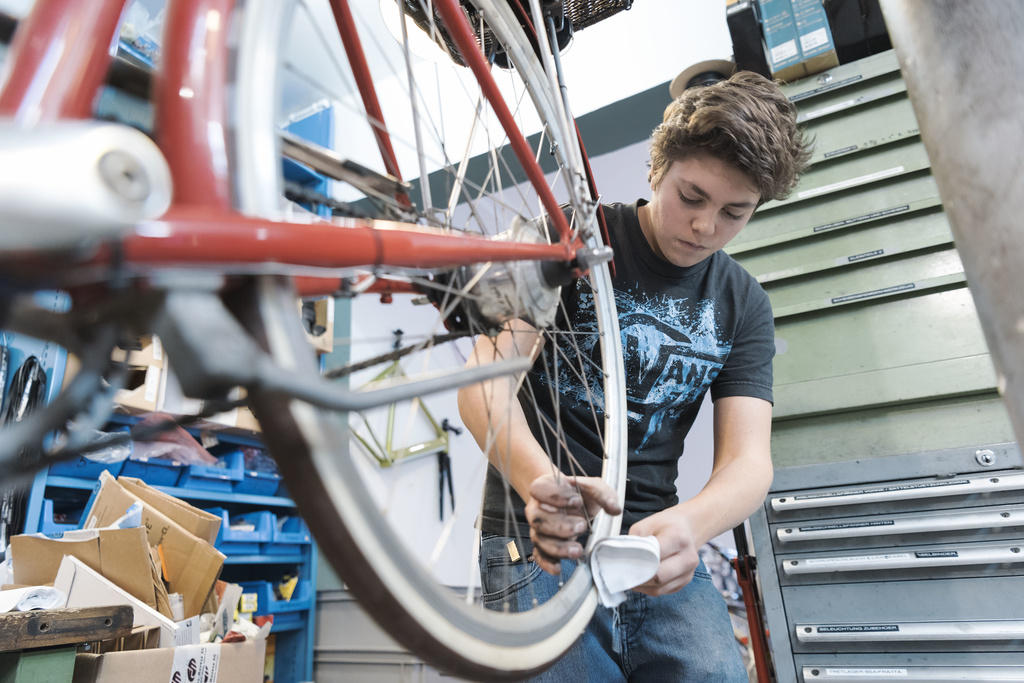
Study: Young men aim more for ‘status jobs’

Young men in Switzerland aspire to higher social status jobs than young women, a study has found. And whether you choose the apprenticeship or university track will have a big impact on your career goals.
Researchers Irene Kriesi and Ariane Basler used data on around 1,000 young people aged 15-21 from the Swiss Longitudinal Survey on Children and YouthExternal link to examine how their educational pathways influenced their job aspirations. The results have been published in the latest edition of the journal Social Change in SwitzerlandExternal link.
Gender differences were already clear at aged 15, when compulsory school ends in Switzerland. Overall, boys said they wanted to be IT workers, professional athletes or car mechanics, but girls opted for commercial employees, doctors or nursery workers.
Making a difference though was the kind of post-compulsory education chosen. In Switzerland, 2/3 young people opt for the vocational route after compulsory school – usually an apprenticeship that combines on-the-job learning with 1-2 days a week in vocational school. Only around 20% of young people in Switzerland go on to an academic baccalaureate school, which prepares pupils for university.
The research showed that while girls aged 15 who were going to baccalaureate school chose doctor, vet, lawyer or primary school teacher as their dream professions, girls going to apprenticeships with mid to low academic requirements chose shop assistant, nursery worker, florist or healthcare assistant.
Bigger status jobs
By the age of 18, boys – whether doing apprenticeships or at baccalaureate school – were aiming for higher status professions than their female counterparts, as can be seen below.
Kriesi told swissinfo.ch that traditional gender roles were a likely reason for this difference.
“Young men, who anticipate their role as male breadwinners, tend to aspire to well-paid occupations with good career opportunities. Young women often anticipate their role as primary caregiver of children, thus curbing their aspirations. Furthermore, gendered occupational choices are still the norm,” said the professor at the Swiss Federal Institute for Vocational Education and Training (SFIVETExternal link).
“Many female-typed occupations offer lower wages, lower status and less career opportunities than male-typed or more gender-neutral occupations.”
Young women’s lower status occupations occur despite them generally having better results at school, the study observed.
Parents’ standard of education was also key in career aspirations, the study added: young people with parents with a higher education generally had higher status aspirations than those with parents with a lower education, even if the young people had similar grades or attended the same educational pathway.
International differences
Occupational gender segregation is known to be particularly marked in countries like Switzerland and Germany which have a strong vocational education and training (VET) tradition, Kriesi added.
“The majority of young women and men have to decide at the early age of 14 or 15 for which occupation they would like to train. Many of the occupations young people can choose for training are either male or female-dominated. Furthermore, young people are particularly susceptible to gender-typical suggestions from parents, teachers and [career] counselors, as well as pressure from peers to adhere to gender norms,” she said.
We know – irrespective of gender differences – that in tracked educational systems like Switzerland’s, young people adjust their aspirations early to what opportunities they think they have based on their academic performance, the professor added.
But in systems such as the American high school, many young people develop very high and unrealistic aspirations, which they only lower after completion of school. In tracked systems, aspirations are lowered much earlier among adolescents bound for vocational education and training. Aspirations rise again during upper-secondary education, when new experiences and insights into given options are gained, Kriesi explained.

More
Are 14-year-olds ready to make a career choice?
Barriers
The introduction of the vocational baccalaureate and the more practically-oriented universities of applied sciences, which allow young people with VET backgrounds to go on to further study, has improved the permeability of the Swiss education system. But some pathways remain rare, Kriesi said.
It is particularly hard for young people who have done vocational training with low or medium academic requirements to make this jump, she explained. It is also costly to retrain in another field, she pointed out.
“Consequently, it is important – particularly for young women – to adopt a long-term perspective and to consider whether the aspired occupation provides the long-term opportunities (in terms of income, status, career options) that someone aspires to,” she said.

In compliance with the JTI standards
More: SWI swissinfo.ch certified by the Journalism Trust Initiative





























You can find an overview of ongoing debates with our journalists here . Please join us!
If you want to start a conversation about a topic raised in this article or want to report factual errors, email us at english@swissinfo.ch.